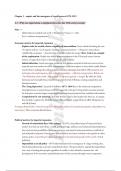Chapter 1 - empire and the emergence of world powers 1870-1919
1.1 - Why was imperialism a significant force for late 19th century europe?
Note →
- Abbreviations included such as: Br = Britain, Fr = France, w = with
- Red = evidence and quotations
Economic motives for imperial expansion
- Exploit trade for wealth, shown via policy of mercantilism. Govts. aimed at limiting the cost
of imports and inc. val. of exports. Gaining overseas possessions → cheap raw. mats, labour,
valuable silks and spices → lucrative (lots of profit) market for europe. Slave trade is an example
of the exploitation. People were sold to plantation owners in the US to pick cotton, harvest
tobacco or sugar then return to Europe with the commodities.
- Industrialization. Goods were mass produced, so it became essential to find new sources of raw
materials and new markets to sell in. Entrepreneurs needed new places to invest their wealth. Britain
was the first to undergo this and so enjoyed economic advantages (1st half of 19th century): new
techniques for producing iron, steel. railways, steamships → efficient transportation. Britain was
‘The Workshop of the world,’ able to prod. Goods more quickly + cheaply. By 1850, the USA,
Germany and eventually France had developed to the level of Britain, creating competition and
therefore tension.
- The ‘Long depression.’ A period of deflation 1873- 1896 due to the enhanced competition.
Unemployment, economic losses and lower wages led to the govt. being under economic pressure.
So, European countries began competing for new overseas possessions that would provide markets.
- Competition for raw materials. Not only did they need to find markets for their inc. in output,
they needed to exploit raw. Mats like cotton (Mozambique), copper (SA), tin (Brit. Malaysia), tea
and silk (China).
‘So long as Britain held a virtual monopoly of the world's markets for manufactured goods, imperialism was
unnecessary’ Brit. economist John Hobson
Political motives for imperial expansion
- Growth of nationalism (late 19th century) - by 1871, the political map of Europe had been
settled. To avoid war and still inc. wealth, power, prestige, influence and enhanced industrialization,
they eyed overseas possibilities. European govts. inc. portrayed overseas possessions as symbols of
national pride and power. France govts. believed that it was france’s destiny to be superior to other
nations and to ‘extend french culture and religion to the backwards people of the world’ - french
politician.
- Imperialism as social policy - 1870: industrialization led to emergence of a large working class,
which demanded social, economic and political reform. The governments argued that imperialism
was a way of uniting their people, regardless of wealth or class, behind a common aim - the
development of the economic and political power of their country through overseas expansion .
, - Strategic control of key regions - before and up to 1869: a long route was used for
transportation. The French then funded the creation of the suez canal to link the mediterranean
and red sea across egyptian territory. European ships were then able to travel more cost effectively
and quicker. This deepened divisions between Britain and France and caused instability in the
Egyptian government. This led to Britain taking control over Egypt in 1882. Their intertwined
interests were the catalyst to scramble over africa.
Emergence of new imperialism 1871 - 1914
Nature of new imperialism (characteristics) Factors enabling new imperialism
Geographic scope - centred in Africa and Asia, due to Medical advancement - Africa known as ‘white man’s
abundance of valuable resources and collapse of the Chinese grave.’ In the early 19th century, cures were found for malaria
empire. and other diseases, making it more accessible for Europeans.
Maintaining peaceful relations - rush to expand caused Technological advancement - New methods to prod iron +
rivalry. The Tre. of Berlin (1884) attempted to prevent steel cheaply → quick transportation. Communication
this and stated European nations should expand in Africa systems improved. Military advancement gave them the
to avoid confrontation. upper hand. ‘Matabele war of 1893’ - Britain won with their
weapons despite being outnumbered by Af. soldiers.
New imperial countries - USA experienced massive -
industrial growth, and needed territory to cont. production.
Japan got power in Asia.
Theory of racial superiority
Early 19th century - white people classified as racially superior to africans and asians. Implied they were
‘inferior’ and ‘less evolved.’ (misconception from Charles Darwin’s evolution theory.) Theory backed by
weak science, unconsciously (or consciously) motivated by political and ideological ideas. Such as enhancing
trade and the 3 Cs. (4th C added: conquer)Widely accepted in Eur. + USA. Many believed it was essential to
introduce 3 Cs ‘commerce, christianity, civilisation.’ ‘The civilised people of the west have a duty to spread
knowledge of medicine, law and christian religion’ - French economist (1891). Nations justified their actions
by claiming they were improving locals’ lives.
Nature and purpose of the ‘scramble for Africa’
- Missionaries like David Livingstone were determined to bring christianity to ‘uncivilised’ africans
- Financed by wealthy entrepreneurs
- Trade opportunities
- Exploited for resources
Scramble for Africa may have become for strategic reasons, but it led to them seizing land simply so rivals
don’t get them, which was an issue of national pride and prestige. Initial 10% conquest became 90% by 1900
Britain Og. concern was to protect its vital indian ocean trading routes. Gold, diamonds and other valuable minerals found
in SA alerted Br. of economic rewards, and moved quickly into Africa before Ger. and Fr. Last 20 yrs of 19th cent. Br
had: Egy, SA, Sudan, Kenya … USA was v critical of this insatiable hunger for territories given their own




